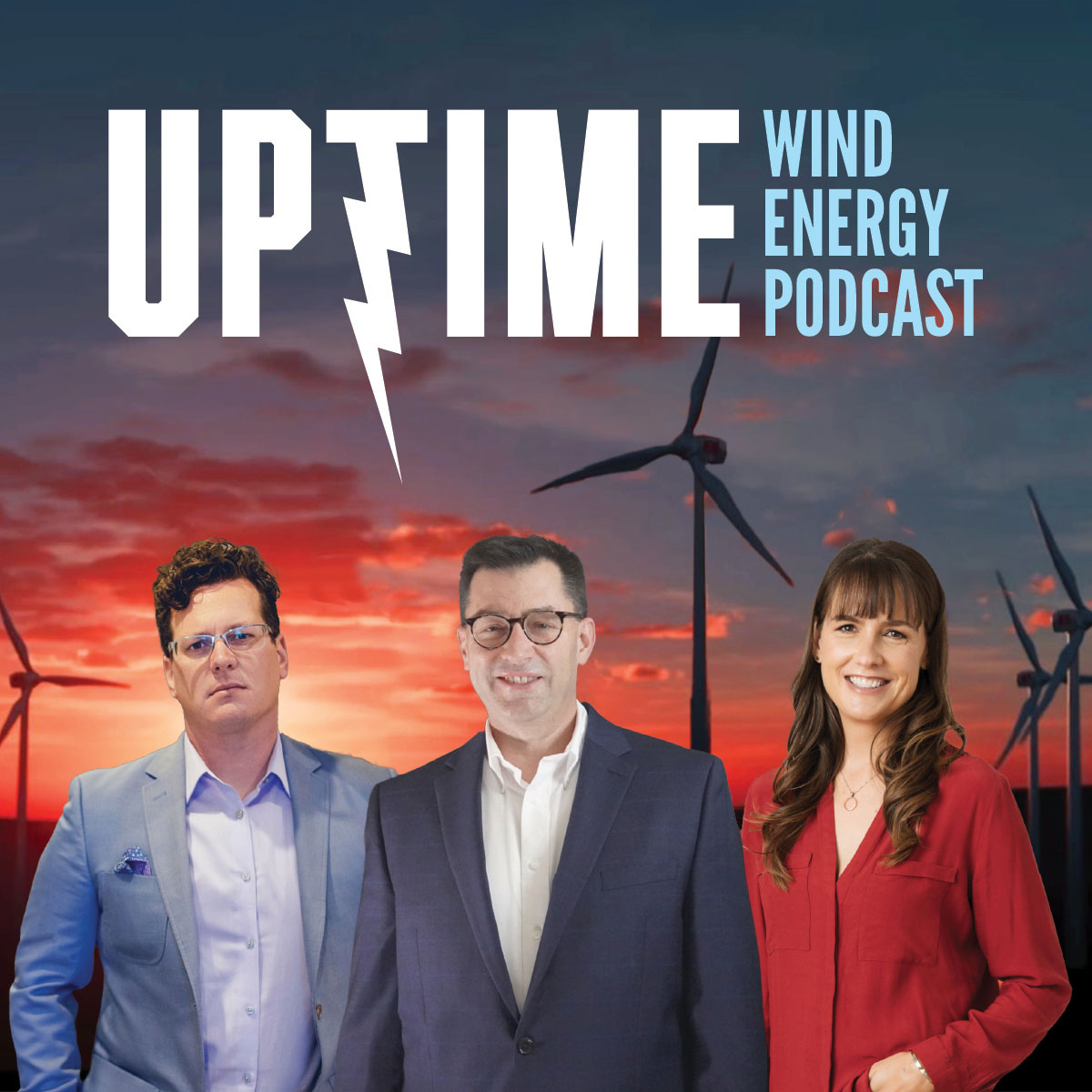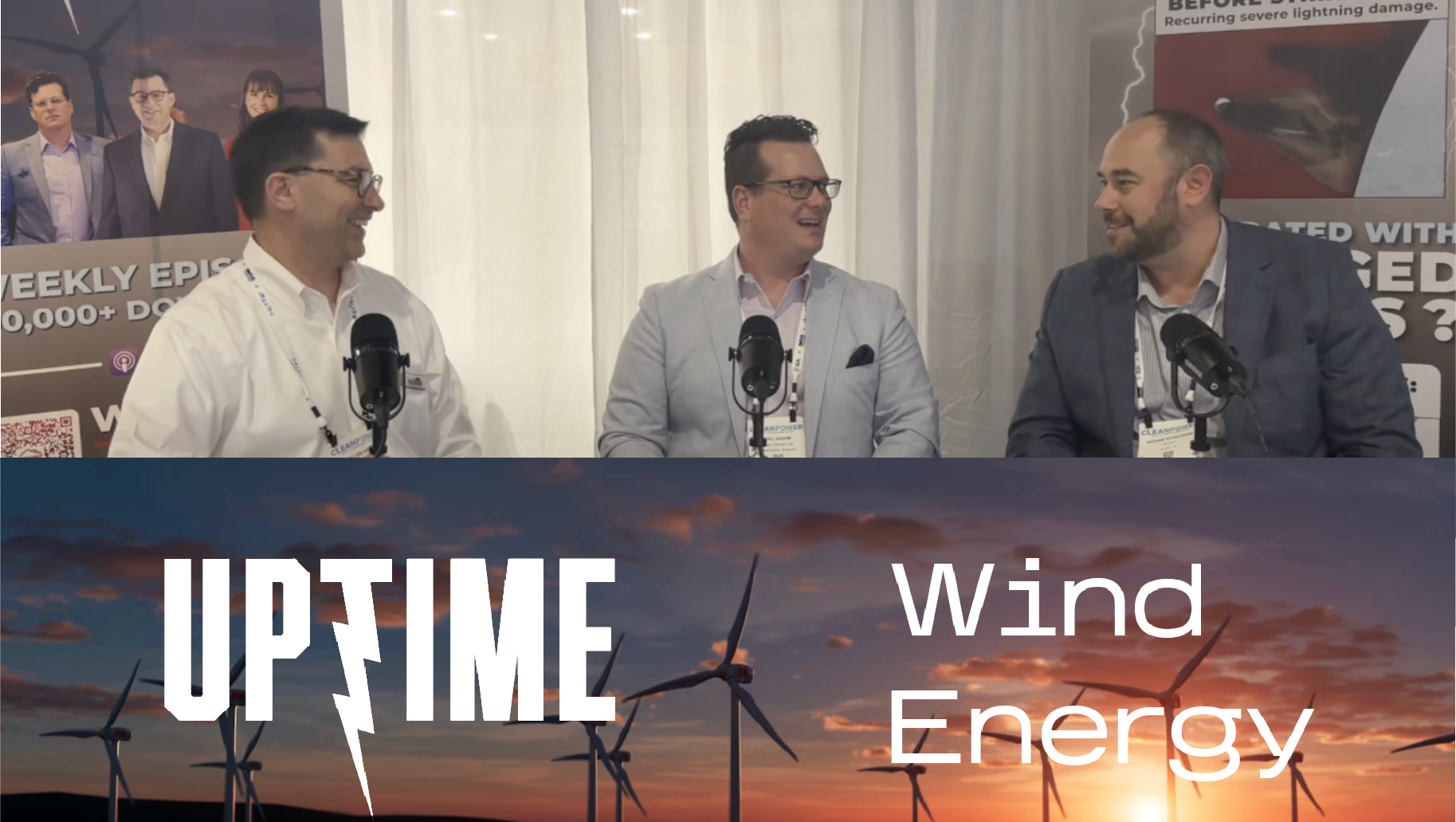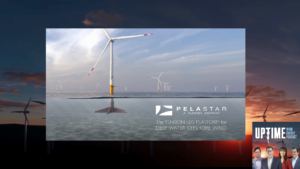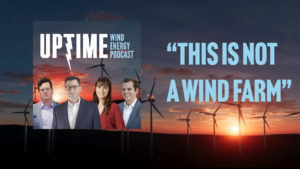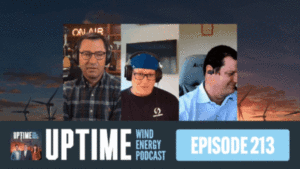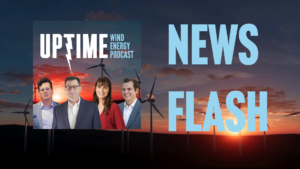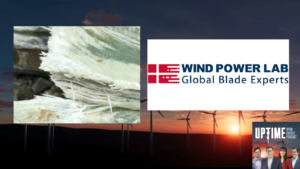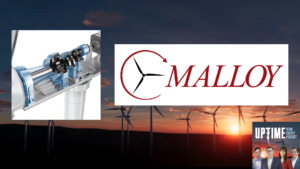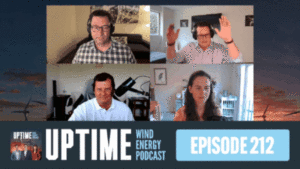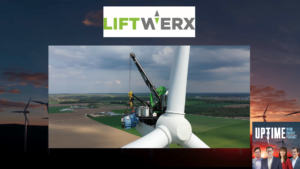As the wind maintenance season comes to a close, it is time to plan for the spring! Safety and efficiency are critical investments for every wind site. In the United States, and most of the western hemisphere, technicians must climb ladders to get to their job sites. This is an unnecessary task and also leads to injuries and down time. Uptime hosts Joel Saxum and Allen Hall visited with Gio Scialdone, President of 3S Lift Americas, in New Orleans this spring to learn more about their Climb Auto System and how it improves efficiency and reduces technician wear and tear.
Podcast: Play in new window | Download
3S Lift – https://www.3sindustry.com/product/climb-auto-system/
Pardalote Consulting – https://www.pardaloteconsulting.com
Weather Guard Lightning Tech – www.weatherguardwind.com
IntelStor – https://www.intelstor.com
Sign up now for Uptime Tech News, our weekly email update on all things wind technology. This episode is sponsored by Weather Guard Lightning Tech. Learn more about Weather Guard’s StrikeTape Wind Turbine LPS retrofit. Follow the show on Facebook, YouTube, Twitter, Linkedin and visit Weather Guard on the web. And subscribe to Rosemary Barnes’ YouTube channel here. Have a question we can answer on the show? Email us!
3S Lift Gio Scialdone
Allen Hall: Welcome back to the Uptime podcast. I’m your host, Allen Hall. Well, we’ve been busy here at the Uptime Podcast this summer and we thought it would be a good idea to relive or re-listen to, uh, earlier podcasts with guests that you may have missed. We thought that it would be great to bring Brack Geodon in three s Lift, and we spoke with Geo at American Clean Power, uh, earlier this spring in New Orleans of all places.
That interview I think is really good ’cause it highlights all the things that Three S Lift is doing to make technicians safer and to get up and down those wind turbines easier with their climb auto system. So if you have missed this episode earlier this spring, no problem ’cause we’re gonna bring it back to you.
Here is Geo Schone with three s Lift.
Gio Scialdone: We’re here again at
Allen Hall: uh, a C P 2023 in New Orleans, Louisiana with Geo Shaone from three s Lift. If you don’t know three s lift, you’re missing out on so much. Uh, three s Lift is about saving technicians and making sure they get up and down, uh, towers safely and, and uh, efficiently.
Gio Scialdone: Gio, welcome back to the program actually.
Thank you for having me, Allen. Joel, nice to to meet you. You as well.
Allen Hall: This has been a really busy show compared to San Antonio last year. Yeah, I think so. Uh, I think much roughly doubled the amount of people from what I can tell. You, I assume you guys have been busy. I’ve been by your booth a couple of times.
So there’s a lot of people thinking
Gio Scialdone: about technicians this week. I think people have to be thinking about technicians. If you, if you, you look backwards and you look forwards in terms of the operational existing towers. You have to think about technicians for your existing fleets. Yeah. You look at the forward projections of the, the, the build out plan.
You have to think about who are the people that are gonna work at these places. Um, We talked about the the competition, indirect competition that some of these workers could. Go be an Amazon truck driver and make 25 or 30 bucks out. Yeah, absolutely. They don’t have to climb a winter on a tower. Yeah. You know, that’s tough work.
So there’s some competition out there, not just inside the industry, but certainly outside.
Joel Saxum: So we know that, like across the industry, of course, it’s been the word for a long time. We’ve talked to a lot of people around the show about just the shortage of technicians. Yeah. Right. And everybody, and you’re starting to see, which is great.
A lot of companies pop up, trainee. Hey, we’re opening a G W O training center. We’re opening this training center. We’re gonna, there’s a blade repair center opening up in, in Tennessee, so that’s fantastic to bolster the whole fill of, of technicians into the industry. But once they’re there, zone three s lift has taken care of ’em.
And another step,
Gio Scialdone: I think, I think one, you know, workforce development is, is something that we talk about a lot. Our customers are talking about a lot. You, you, the, the recruitment like you’re talking about I is, is step one and the retention is really the hardest part. Yeah. Right. Um, you could recruit people with probably a good paying job and an exciting job to go up and down a tower and you get to do mechanical, electrical work.
Um, six months maybe. Yeah. Even the guitar, it’s hard. It’s hard. It’s hard. It’s a war of attrition, right? It is. Indeed. Has 700 and something open Wind tech jobs today. Right now in America right now. Yeah. Um, and, you know, our, our product is Climb Auto System, lift Retrofittable to every ladder. Um, we see customers improving their ability to retain tax and, and, and, and that’s, you know, ultimately that’s leading.
To an improvement in operational efficiency too. Right? Right. Keep the people longer, keep them happier at their job. Yeah. Which is hard to do. Um, and they’re probably gonna do better at it. And I think we’ve seen some data that that proves that. Yeah.
Joel Saxum: Off air. You had mentioned morale. Morale on a team, right?
Yeah. You may have, you may have traveling groups that come in, like the blade repair guys bounce from site to site to site. You know, how happy they’re to show up on a site. They’re like, oh man, this site’s got lifts. You know what I mean? Like, their days just got easier. Right. That and, uh, you know, we, we also talked about some places like they have resident, uh, service technicians or an O one M contract where if they, those guys get to go up and down a tower every day, uh, on a lift, they would much rather do that than a climb assist or just climbing a ladder, you know?
Gio Scialdone: Yeah. Yeah,
Joel Saxum: the ladders are tough. Even a short tower, 72 meters, 80 meters is, that’s
Gio Scialdone: a long ways. The majority of our retrofits are on 80 meter towers still. You know, I mean, the repower, the repower boom happening now is a lot of those towers are 80 meters. And what a better time to install a lift than when you’re doing a repower.
You’re opening up and sometimes you can, you can add to the, the, the, the sort of repower equation, uh, to qualify by adding a lift. Um, We, we, we think that there’s, there’s probably room for a lot more lifts in the field. We think that that, um, new construction, certainly there’s options. There’s service lifts, there’s climb auto systems, right?
Um, we have, uh, I think maybe 1000 or more new construction units being installed this year. Nice. Wow. Significant amount. Yeah. Good for you guys? Yeah. Um, 6,000 total. By the end of the year, we’ll have 10,000. So I, I don’t know how many turbines are there? 73,000. Us? No, we’re, we’re one. We’ll be one seventh by the end of the year.
Yeah. That, that’s 15% market centric. That’s great. Yeah. And I think, you know, the, the eyes of the owner operators and, and not just the operators too, but the asset owners. Yeah. They have long-term service agreements. They care about their ability to, uh, they’re not just. Spliting back to the, uh, o and m contract saying, well, it’s your job.
Figure it out. Yeah, no, let, let’s work together. And I think that’s, that’s a nice thing too, seeing the collaboration between some of the owners and the, and the operators.
Allen Hall: Obviously in this conference, when I stop at different booths, you see a couple of different things. A lot of G W O training, which is all about safety.
So a lot of the, uh, maintenance groups are doing internal safety training. Uh, when you talk to operators, one of the first things that pops up is safety. You see helmet companies, gear companies, uh, everybody is really concerned about safety because there’s so few technicians. You can’t afford to have somebody out, and in the cost of that is extraordinary.
You, you want to take care of your technicians at this point. Uh, There’s a better, massive push. 10 years ago, a little more wild west. I I, the way I saw it, right? Uh, probably way the world saw it. The, the technicians were kind of free to do their own thing a little bit. And sometimes safety lacks. And you see that on LinkedIn every once
Gio Scialdone: in a while.
Yeah. You see some s
Joel Saxum: you see some random videos that are not now
Allen Hall: No, no, no, no, no, no, no. So the, the tide has shifted. Yeah. A good deal into more safety. And I think that makes sense. And three s slipped is part of that safety equation.
Gio Scialdone: You mentioned G w o we’re, we’re partnering with G W O Safety, um, uh, uh, trainers.
Our lift, our climb auto system is in their training centers. Oh, that’s genius. Yeah. And they’re starting to offer that as an add-on. Yeah, sure. Right. So certified on this. Yeah, yeah. Certify it. Yeah. You know, we train them to provide a sort of co-branded certification, um, as an add-on. It’s not a, it’s not a G W O course, but it’s performed by a G W O certified.
Trainer. Okay. Trainer. And it’s an add-on. And, and, you know, the, the safety piece is huge because we, we’ve seen, and you know, I’ve traveled to so many sites like you guys have, and you, you see, um, sort of a unicorn when you see some of the older techs and you, and you’re like, Hey, well you’ve been here, you’ve seen some things 12 years.
Like yeah. How you doing? And, and some of the things we still hear like, well, we got a couple knee surgeries and Yeah, that’s pretty, you know, I wish this thing. I wish this thing was around 10 years ago. Yeah, that’s what I hear. Yeah. You know, but it’s here now and I think, I hope, and we hope that 10 years from now when we’re visiting there, the, the, the discussion’s a little flipped and it’s really thankful that we got these lifts and our company invested in our safety.
Mm-hmm. Because I wouldn’t be here if, right now. Yeah, absolutely. You know, looking backwards. So I think that’s a, you know, and that’s, that’s job. There’s a job creation aspect, right? Yep. Job sustainability. We’re talking about, you know, good paying jobs in, um, areas that may not have a ton of opportunity and, and a lot of more what a better job to have.
Yeah. And let’s keep these people in those jobs. Older technicians, demographics, more women can, can, are we’re seeing, uh, enabled to technicians to be in the job. Yeah. We’ve got a, we’ve got a utility customer who’s retiring coal plants and they’re, they have their own transitional program. To take some of their coal techs and move them into wind.
Oh, that’s cool. And, and, you know, uh, uh, one of the things that’s beneficial is to have a lift. You know, they’re 50 years old.
Joel Saxum: Right. Yeah. Been around for a while. I think of it like, you know, this is a, this is an innovation we’re seeing that you guys have put out three s lift within the wind industry, but if you think in the, of the general industry, I have a lot of friends that have bad backs and bad knees in their 35 and 40, right.
That have been pouring concrete and building homes and roofing, and doing all these things their whole lives. And when things have come along within those industries, it changed the way they are. Yeah. You see the wheelbarrows with just like, they got electric batteries in ’em now. Yes. Oh. Like, man, when I was young and I was wheeling concrete, I wish I had that so much.
I know, right? So it’s kind of the same
Gio Scialdone: concept, right? Well, the cl remember when that was starting, right? Right. Um, you know, one of my first projects in 2010, there were, there wasn’t, ISTs weren’t prevalent. I think probably historically, maybe 13, 14, 15, they started to come around and generally speaking, we’re standard in the 1516 timeframe.
Um, and I kind of liken our lift now. I hope that that’s the new standard. You know, I think from a operational cost effectiveness, it’s, it’s there. It’s. I was doing like the Blackberry iPhone analogy for Clima Assist or Lyft. Right. Like the Blackberry still, you probably still get away with it. Yeah, I know.
They’re not making it anymore probably. But look, a, a Nons smartphone is still effective in some way. Yeah, sure. I think that’s the clima assist. I think you’re still climbing, you know, um, and, and this, this eliminates that altogether. Yeah. Yeah. Um, we, we met with some, one of our customers who, who works on the, the Ts, uh, The lights on the top.
Like F was thinking tsa. Oh, F aa F AA lights. Yeah. He was doing, uh, lights, light change outs. It’s an hour job, right? Okay. Yeah. What is he did? He can do four in a day. You could do 10 or 12 in a day with the lifts. Yeah. So think about the, the downward, uh, or sort of downstream effect, the efficiency of it, not just on the owner operator, but some of the service providers.
The bottom line,
Joel Saxum: right? The o m cost, like you could quantify an r o I for it based on the fact that if I have to climb. Three towers a day to, you know, check the oil, you know, do oil changes. Okay. Now I can do five. Yeah. Right. So there’s an R O I A
Gio Scialdone: bonus right there. There is, there is. And you know, one of the other things I’ll hit on, maybe you got some other topics, but I went to the opening ceremony, um, yesterday and general.
Stan, Mick. Crystal. Crystal, yeah. Yeah. Thank you. Sam McChrystal. Uh, he, he talked about culture. And you know, I’ve, having been in this role with three Ss for five years and seen us grow from zero installations to 6,000, I’ve seen the development of those cultures ebb and flow over time. And he defined culture, I think in some way of, of a, a subset or a combination of the behaviors of the employees at a company.
Right. How do they behave? That is your culture. Yep. This product helps the technicians and they will feel, uh, valued, you know? Yeah. They will feel valued. And, and that is a, that is a, a feeling of gratefulness that you wanna work for those companies. And we’ve seen the companies that are investing in this product, having, uh, a lot more applications to go work for them.
Um, their culture, their morale collectively is, is improving. And I think they’re seeing the benefit of that. Operationally financially as well. Yeah, absolutely. It’s kind of a full circle
Joel Saxum: now, wait until we get offshore and the towers are 160
Gio Scialdone: meters. I know. Oh, yeah. I know. They’re gonna have huge, huge service lifts that take three people up at a time.
You know, it’s, yeah. Yeah. We, we’ve, we’ve thought about, I mean, we’re, we’re in the offshore space as well. Yeah. Uh, qualifying our service lifts three s does more than just the climb auto system. We’re selling blade maintenance platforms. Um, you know, uh, accessories, safety systems, rescue devices, self-tracking lifelines, these kind of things.
Right now our, our bread and butter is, is, is the lift, and that’s really helping us get noticed on other Yeah. Other aspects of everything else. Oh, sure, sure.
Allen Hall: So Joel and I had talked a couple of weeks ago and we’re talking about technicians and getting some feedback from technicians, like, how’s it going out there?
Yeah. And
Gio Scialdone: the
Allen Hall: real feedback
Gio Scialdone: was hard push. Technic this are
Allen Hall: struggling. Right? It’s hard. They are. And plus the cyclical nature of the business where you’re working from spring to fall and then you gotta find a second job sort of thing. It’s a tough, yeah, a lot,
Joel Saxum: right? A lot of the feedback was we’re being asked to do what takes 12 hours in eight because we’re short staffed, don’t have enough people, don’t have enough people, there’s not enough hours in the day to get done.
We have to do, but. Corporate won’t give us extra personnel because of o and m
Allen Hall: costs. Right? Right. People are expensive, equipment is not. Thats,
Gio Scialdone: it’s a onetime cost’s. I think the lift makes sense. Right? Yeah, I know. I think, I think, and that has taken time for us to convince some of those customers Yeah. To, to retrofit with our, with our, unfortunately, sometimes it’s taken, um, you know, someone to pull a fire alarm, like, oh man, we only have three techs right now and we need six, and this has been going on for.
Months. We really need something. Now what can we, what’s a
Joel Saxum: stop gap? What can we do to fix
Gio Scialdone: this fight? Yeah. Yeah. And, and that was, I think, you know, a year or two, a couple years ago that was happening. Now I’m seeing customers really get out in front and seeing it. And I think it’s a good thing. Like they’re, they’re, they’re looking at, um, you know, the, what the OEMs are doing.
The OEMs are offering this product to their customers as well. Sure. We see some OEMs, uh, offering an improved service rate. Really, Hey Mr. Customer, we’ll give you a long-term service price here. If you install a climb assist, we’ll give you a service price here. If you buy a three s lift, climb, auto system.
Oh, that’s all sense. Yeah, absolutely. It all makes total sense. Makes, makes sense. The oem, the o m, is gonna benefit because they may be able to have a lower head count at that site. Right. You can do more with less. Right? Yep. Um, that, that’s a cost benefit. Yeah. And you know they’re gonna be more efficient and effective to meet their contractual.
Availability demands and things like that. It was like you had
Joel Saxum: mentioned the, the last climb of the day concept. Right.
Gio Scialdone: 3:00 PM climb, you know, the 3:00 PM climb. Yeah. The Saturday climb. There’s some sites in, um, you know, some sites that aren’t. We were talking to a customer that’s small turbines, I shouldn’t say small, but small sites, four or five spread out.
There’s not a site office. They’re not. Uh, and it’s common in Europe, right? Yeah. Very common. Yeah. Where they’re spread out. Europe mostly has services. Yeah. Um, we think that this customer’s gonna benefit from the retrofit ’cause a technician who’s mobilizing or deployed right away can get right to work, go right up tower, not, and maybe there’s three or four things they need to do in each of those towers.
They’re not limited by climbing anymore. You know, there’s a, there’s a benefit there. Absolutely. So, Uh, this is really
Allen Hall: enlightening. I mean, some, some of the things you and I have been hearing, Joel Yeah, yeah. Back feedback. Jo’s really feeding into that. This is the same concept, right? That, that, uh, as an industry, it’s gonna be changing a lot.
I, I, it’s good to hear that operators and odors are starting to put the climb model system in just to get rid of the technician issues. Getting to a couple of thousand
Gio Scialdone: units is big. And the best part now Allen is, is our, our team is gelling. The three S lift team is, you know, we’ve got a 40,000 square foot warehouse.
Operationally we need to support the industry and that means with, uh, the right troubleshooting engineering teams, which we have, we’ve got the right project management teams we’re gonna be installing at 50 sites in the next eight months. Wow. Wow. So that’s 50 deliveries and 50. Um, commissioning 50 trainings on site.
So we now have, you know, we have 40 technicians that install these, we, we leverage some partnerships with, but it’s been fun to see, um, sort of the fruits of our labor over the last couple years, grow and see our customers really, um, you know, be the beneficiary of, of what we think is just an, an awesome product, you know?
Yeah. Congrats on the hard work. Yeah. Thank you. It’s paying off, man. Thanks for having us for, again. So how, how does,
Allen Hall: uh, an operator owner. Find three s. Lyft, what’s the best way to find three
Gio Scialdone: Ss? You can find us on LinkedIn. Okay. You can find us at uh three s lift.com. Okay. Um, you know, I’m very active. I get, I, I think my, there’s an in info email address that comes right to me.
Yeah. And I dispatch that to whichever sales team we need to. So, um, yeah, we can, uh, you know, we’re pretty active on the, on the web, so Yeah. Easy, easy to get ahold of.
Allen Hall: Geo. It’s great to see you in New Orleans. Glad you could make this show. This is fantastic, and it’s great to hear the success of Korea’s lift.
It’s fantastic.

